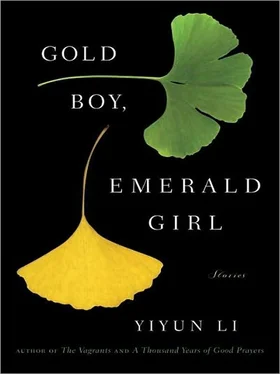Ying seemed eager to continue the argument with Ailin, yet Ailin was not in the mood anymore to offer the girl a chance to dispute what she did not understand. Had Ailin not been stubborn in holding on to her girlhood so that no man could replace her sworn sisters, she might well have got married and had a baby at the same time as Mei and Lan; it could have been Ailin’s son who was arranged to marry Lan’s daughter, and he might or might not have got the three families into the tragedy even if the girl decided not to honor the arrangement. Ying might have not been born but there might’ve been another girl in her place, with her name, who would perhaps be content in living her life out in the provincial town, but how could Ailin make the girl understand that all the existences surrounding her, solid and reasonable though they seemed to be, could be changed if the fantasy of a lifelong sisterhood had not occurred to Ailin on that spring afternoon fifty years ago?
After waiting in vain for a long moment, Ying looked defeated. “Well, if they hate you as much as you say, the more reason there is to put up the picture so they will be looked at in my restaurant while they don’t know it,” she said.
And they could smile on the wall into the indifferent eyes of foreign strangers, as if time had stopped at the photographer’s cramped studio fifty years ago, Ailin thought, and turned away from the poster before her sworn sisters caught a glimpse of her moist eyes.
THE MAN NOTICED the girl first, moving cautiously from one storefront to the next, not glancing even once at the shop windows. She wore a white dress, more like a smock, with a pink and purple floral print, and her bare arms and ankles were innocent as a small girl’s, bony and smooth. The man watched her walk past him on the roadside bench and stood up. You remind me of my wife when she was your age, he practiced in his mind. His cane bumped into the backpacks on the ground, which belonged to the two college students sitting next to him on the bench, and they looked at him with disapproval before resuming their intimate conversation, the boy’s lips touching the girl’s earlobe. They had hinted, when he had first taken the seat next to them on the bench, at their unhappiness at his intrusion, but he had refused to leave, having every right to the bench as much as the young couple did.
You remind me of my wife when she was your age, he said now to the girl. It was not the first time he had started a conversation with a young woman with the line, but he meant it more than any time before. The way she maneuvered through the late-afternoon street — vigilant, as if she was aware that anyone, anything, could run her over without the slightest idea of her existence — was how he remembered his wife — not only as a young woman when they had first met but also as an older woman in the next forty years of their marriage. She had been taken advantage of by many unfriendly strangers cutting into the lines in front of her, colleagues getting promotions that belonged to her, three miscarriages, and a tumor in her liver.
She passed away six months ago, the man added now. We don’t have children.
The girl looked at the old man, unconvinced by his widower’s sorrow. This was not the first time she had been approached this way, older men claiming that she reminded them of their dead wives and first loves. She was never harsh with them. Even with her physics professor, who took every opportunity to touch the arms and backs of his female students, she did not flinch as the other girls did; the graze of his hands was no more harmful than another man’s recognition of his own dead wife in her. They were in as much pain as she was, and they did not add to her suffering.
Have you tried the chrysanthemum tea? the man said, pointing to the window display of the pharmacy where the girl had stopped. My wife used to say it helped to get any poison out of someone’s system.
The girl sighed noticeably. She would learn every bit of information about his wife if she did not stop him; not that she minded being told about and compared to a dead woman, but she had her own love to take care of on this evening. She nodded to the man and went for the door of the pharmacy, wishing that he would take his leave and find another girl in the street.
The man followed her into the store. Fluorescent lamps lit the place from the ceiling and from underneath the glass counters. Two middle-aged women, one sitting behind the cash register and one behind the counter at the opposite side of the store, exchanged information about their husbands’ annoying habits, agreeing and encouraging each other as if they were deeply engaged in a verbal Ping-Pong game. Another customer listened while studying pairs of reading glasses but then left without buying. It was one of those long evenings, the man thought.
The girl walked from counter to counter and feigned interest in various products. She did not know how to stop the man from following her, since he had every right to be standing in the same store that she was, but soon it would be nightfall and the women would close the shop without asking her what she needed. The girl looked at the clock on the wall and panicked. It was all as she had planned it, that the pharmacy would be free of prying eyes in the last ten minutes before closing and she would be spared embarrassment; she did not foresee the tenacity of a lonely man.
There’s a good wonton stand across the street and I’ll buy you a bowl of wonton soup, the man said to the girl.
His wife must have liked wonton soup, or else she must have cooked good wonton soup for him. The girl thought about being old and having few comforts to hold on to. She was twenty-two and found it hard to be comforted by the little things in life. For the past two years she had seen bigger events than she had been prepared for, protests that led to bloodshed that led to arrests and interrogations; the tragedies would not be personal if not for her having fallen for a boy hero — she had not been the only one to admire his flamboyant gestures in front of Western reporters’ cameras, but two years later, she was the only one to go to his parents’ flat and sit with him every night. Don’t keep your hope high, his mother had warned the girl earlier on, but she had not believed that the spirit he had shown in the square would be so easily crushed by the interrogations. She had gone to his parents and begged to see him until they had to accept her presence; still, they told her that the boy, officially a madman now, would not pass the test for a permit to get married.
Marriage is for those who still believe in the mundane, she replied and later told her parents so. She went to sit with the boy and listen to his long monologues on history and philosophy and the fatality of humankind; she noticed repetitions but did not point them out to him, nor did she ask what he thought of her presence in his bedroom. Perhaps she blended in with the furniture well, but even a piece of good furniture might save someone’s life by miracle. He touched her face and arms sometimes, absentmindedly, as someone deep in thought would stroke a cat. The tenderness of his hands kept her hopeful of his recovery; after all, he had not been handled with any consideration in the two-month detention.
It’s just a bowl of wonton soup, the old man said, more vehemently than he had intended. The girl’s quiet rejection shamed him; his wife would have smiled and thanked him because she knew the invitation bore no ill intention. Even if she were indeed unable to join him, she would have given him a good excuse instead of letting him stand in the middle of the shop like an idiot. The world is not as bad as you think it is, he said to the girl. Enough young women these days were treating him as if he were as old and non-feeling as a-half-dead tree, but he could not stand that she, who reminded him of his wife in another life, was being one of them.
Читать дальше
Конец ознакомительного отрывка
Купить книгу












